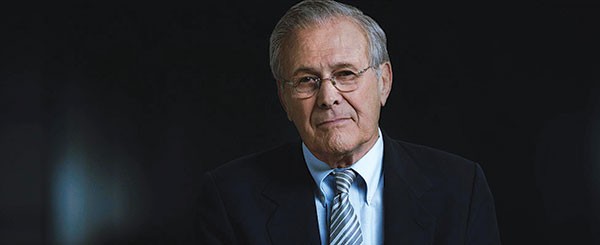When we lefties recall America's misbegotten wars in Iraq and Afghanistan, we often rely on a shorthand explanation: George W. Bush, famous for his intellectual disengagement, led us into a quagmire by following his gut. But as Errol Morris' profile of Donald Rumsfeld reminds us, plenty of Bush advisers led with their heads ... and brought us to the same place.
The Unknown Known consists primarily of Rumsfeld, Bush's Secretary of Defense from 2001 to 2006, answering questions posed off-camera by Morris: No one else is interviewed. The film also draws from the 20,000 memos that Rumsfeld dictated over a four-decade-long political career. Rumsfeld himself gamely reads excerpts from the memos, which recipients nicknamed "snowflakes."
Over its 142 minutes, the film captures Rumsfeld's unique blend of folksy aggression — when he says "goodness!" in response to a question, you can tell he means "go fuck yourself" — and fortune-cookie epistemology. (The film's title itself riffs on a famous Rumsfeld dictum: that there "known unknowns," where you are aware of needing more information, and "unknown unknowns," where you are ignorant of your own ignorance.)
Morris does call out some of Rumsfeld's more glaring obfuscations. When Rumsfeld claims the Bush administration never linked Saddam Hussein with Al-Qaeda, for example, Morris rolls archival footage of Rumsfeld himself doing precisely that.
And some of the snowflakes are intriguing: In one early-1980s missive, Rumsfeld described the Middle East as a murderous "swamp" and suggested America consider lowering its profile.
But snowflakes melt away when you try to touch them, and Rumsfeld proves desperately short on self-reflection. Here he is on the lessons learned from Vietnam: "Some things work out, some things don't." Was Iraq worth it? "Time will tell." This is a portrait not of the banality of evil, but the evil of banality.
Morris perhaps hoped to reprise his 2003 film The Fog of War, in which Vietnam War architect Robert McNamara agonized over his mistakes. But when Rumsfeld chokes up, it's while recalling a grievously wounded U.S. soldier who — spoiler alert! — survives his injuries. No need for self-examination here! Morris tries to pin Rumsfeld with the camera's gaze, but Rumsfeld stares right back — coolly, even amusedly, radiating a certain Mephistophelean charm.
Morris might have done better to call on some other talking heads, who could've offered more forceful critiques than he was able to muster. Or he might have interviewed the soldiers and innocent Iraqis who paid for Rumsfeld's miscalculations.
As it is, both the film and its subject generate little more than frustration. Not because Rumsfeld walks away unscathed, but because it's not clear he was ever there at all.















